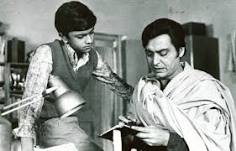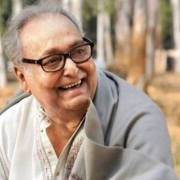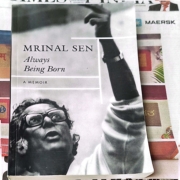Is Feluda’s charm waning on today’s Bengali audience?
It’s not easy to step into Feluda’s shoes on the silver screen, the role of the iconic Bengali sleuth created by Satyajit Ray. Indraneil Sengupta, possibly the last of the viable options left in the regional industry, must be realising it the hard way despite trying his best in Hatyapuri (House of Murder) – the latest creation.
A visit to the cineplex in my neighbourhood to watch the film last evening – churned out by the master’s son Sandip Ray on the big screen with a brand new trio in the key roles after a long gap – posed some home truths before a Feluda addict like me. Two of the screens showing a family drama, a home production of the local industry’s reigning superstar, had serpentine queues while the response looked lukewarm for the adaptation of one of the most popular of Feluda’s 35-odd adventures.
The proof of the pudding always lies in eating, and it holds true the most in case of any art form rather than reading the reviews. I had tried to steer clear of the non-stop assembly line of Feluda, either on the big screen or OTT platforms in recent years for their by-and-large insipid nature – and Hatyapuri couldn’t do much to re-energise my interest levels in such screen adaptations.
Ray jr’s film has the so-called modern twists like a well-appointed hotel this time but with caricature of a manager – the types of whom you don’t meet anymore, or the cellphones and google searches. However, it is verbose, some of the key casting a bit faulty but most importantly – it has a storyline with which only those inhabiting the Ray’s world and it’s nostalgia will connect readily. This is where the biggest conundrum lies – is the discreet charm of Feluda then waning on the audience of our times?
To start with, Feluda’s adventures were written with a teenage readership in mind all along but ended being lapped up by all age groups in the educated Bengali households in the ‘70s and ‘80s. The storytelling (done by his cousin Topshe) were simple, crisp narrative as the plots revolved around adolescent-friendly crimes like theft, murder, impersonation, fraud and later the occasional drug-related offence.

Any adult-friendly offences were thus avoided, quite unlike the complex world of Byomkesh Bakshi, the sleuth created by novelist Saradindu Bandopdhyay in the Fifties and Sixties. It may almost sound blasphemous, but it could be difficult for today’s teenagers – or the smartphone generation – to relate to such crimes – the plot of Hatyapuri being a case in point.
As the trio of Feluda-Topshe-Lalhohan babu visits Puri – the eternal favourite sea resort of Bengalis on a leisure trip – they bump onto a temperamental old man who lives in a house in a remote corner of the city and collects priceless, ancient manuscripts as his hobby. The twists and turns revolve primarily around his most prized collection – leading to intrigue and two murders.
Any adult-friendly offences were thus avoided, quite unlike the complex world of Byomkesh Bakshi, the sleuth created by novelist Saradindu Bandopdhyay in the Fifties and Sixties. It may almost sound blasphemous, but it could be difficult for today’s teenagers – or the smartphone generation – to relate to such crimes – the plot of Hatyapuri being a case in point.
How deep can the offence of smuggling manuscripts sink in with today’s audience? The secrets in Feluda’s cases are anything but dark and the conclusion signals a triumph for the Ray brand of humanism – but this may not be enough to hold the modern generation in a thrall. It’s virtually impossible to look at Feluda through the prism of the modern society – where he may be needed to delve into a political murder or rape. Rather than ending up in disasters like the web series called Ray, which saw a bustardisation of his short stories, it may be a better idea to leave Feluda in the printed words.
Finally, it’s undeniable that any modern avatar of Feluda-Topshe- Lalmohan have continued to suffer from comparison with the ‘originals’ – Soumitra Chattopadhyay, Siddhartha Chatterjee and the inimitable Santosh Dutta in Sonar Kella and Jai Baba Felunath. A counterpoint to the logic could be the fact that detective franchises are bound to see such change in actors, but Ray himself had gone on record that he had stopped thinking about a third Feluda film after the death of Dutta – thanks to his memorable characterisation.
Now, how do you counter that?







Leave a Reply
Want to join the discussion?Feel free to contribute!